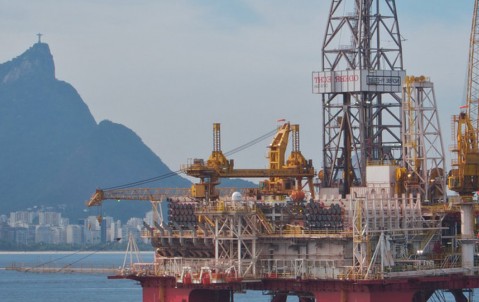
Brazil’s oil rush
The discovery of vast oil reserves is set to transform Brazil into one of the world’s major energy exporters, and has sparked a scramble among energy insurers to get involved.
The towering forms of oil platforms in Guanabara Bay, on their way to oilfields far off Brazil’s coast, have become just as familiar a sight in Rio de Janeiro these days as Sugar Loaf Mountain and the Christ the Redeemer statue, and act as a potent symbol of Brazil’s emergence as a global oil superpower.
The Western Hemisphere’s biggest new oil finds in the past three decades have been made in Brazilian waters. Libra, just one of the fields discovered in the Santos Basin, situated around 200 miles off the Sao Paulo coast, is estimated to contain up to 12 billion barrels of recoverable oil, and is expected to generate revenue over its lifetime roughly equal to the annual GDP of Austria.
These finds, along with the Brazilian government’s insistence that much of the equipment required by Petrobras, the national oil company, to extract, transport and refine the oil must be built within the country, has sparked a national economic boom.
Every firm, from the oil major to the rig builder down to the company making the pipes through which the oil will travel up from the seabed, needs insurance cover and the world’s energy underwriters are queuing up to offer it.
The appeal to underwriters is the sheer breadth of risks to be insured, says Carl Day, Upstream Energy Line Underwriter at Hiscox. “Risks cover the full upstream insurance spectrum, from constructing the rigs to exploring for the oil and operating the platforms. The client diversity is wide too, from oil majors to start-up exploration and production firms, drilling and service contractors through to construction yards. On any given day we could be asked to insure one of Petrobras’s deepwater rigs, with a value up to $1.5 billion, or to provide $10 million of equipment cover for a small oil firm drilling two exploratory wells in the Amazon basin. Brazil offers an entire book of business.”
Big oil, big challenge
But getting the oil to the surface requires Petrobras to continuously push the boundaries of logistics and technology. Most of Brazil’s recent discoveries lie trapped far off the coast in fields four miles beneath the seabed under a thick layer of salt. The pressure at these deposits is double that of a conventional oil field. New techniques and kinds of materials are required to operate at this depth, mainly to withstand the highly corrosive conditions while keeping weight down to a minimum. Since cracks spread faster at higher pressure, even slight corrosion can quickly become disastrous.
Petrobras is investing heavily in research and development to solve the problems of extracting oil from the subsalt deposits. It is recognised as one of the world leaders in deepsea oil exploration and enjoys a good record to date. It is so confident in its own risk management that it runs large retentions, and chooses to not buy insurance against blowouts. It still purchases plenty of insurance coverage, however. The difficulty for international underwriters is in getting access to it. Brazil’s incumbent insurer, Itaú, and state-run reinsurer, IRB, have major influences on insurance placements.
International insurers act as reinsurers to Itaú and retrocessionaires to IRB, but, says Day, “the challenge is in getting access to the right business at the right price with the necessary underwriting controls. It’s a complicated market, in which London market insurers tend to only get access at second or third hand, as well as being highly competitive. For example, it is often the case that you have a local tender with local insurers, even though in reality they will end up running little of the risk.”
Brazil’s oil bonanza has been a shot in the arm for the international energy insurance market: an infusion of new risks when new oil finds have become increasingly rare. It’s not surprising that many are jostling to underwrite them.
That’s meant that the economics of underwriting a nascent market have been turned on their head in Brazil. “Normally when you enter a new market, prices start out high then go down as the loss experience becomes known and competition reaches equilibrium,” says Day. “But, in Brazil, prices seem to have started out competitive, even though there’s little experience on which to base them, as, especially in terms of construction, few big projects have been completed so far in the new yards being commissioned.”
Hiscox has taken the lead in developing a new channel through which to source Brazilian energy risks. It has forged a close relationship with Austral Seguradora, a local insurer, to target small, new players in the oil industry. The oil boom is spawning dozens of start-ups, many owned or run by ex-Petrobras managers, who are taking an active part in helping the country to exploit its vast reserves of liquid gold.
“We were among the first London market insurers to work closely with a Brazilian insurance player. We wanted to work with a strategic partner to help build its profile and further ours by offering our international energy underwriting expertise. It shows we’re willing to use our initiative to look for solutions outside the box,” says Day.
Don’t count petrodollars too soon
But risks remain. It has almost been taken for granted that Brazil is sitting on vast reservoirs of black gold. To date only a fraction of its reserves is currently considered proven, as the estimates are based on the results of only a handful of exploratory wells. Although initial production at Petrobras’s subsalt fields is encouraging, other explorers have hit problems.
OGX, the oil company of Eike Batista – once Brazil’s richest man – shows that Brazil’s oil boom isn’t without its busts. OGX, once Petrobras’s biggest private-sector competitor, is teetering on the brink of bankruptcy after declaring that its only producing wells have turned out to be failures and are likely to be shut down.
The legal regime is also an issue. Chevron agreed in October to pay around $135 million in compensation to end the largest-ever environmental lawsuit in Brazilian history. Brazilian prosecutors had sought $18 billion in damages from Chevron and its drilling contractor Transocean, as well as filing criminal charges against the companies and 17 of their employees, for an oil spill in a field far off the Brazilian coast. The case, which lasted for nearly two years, raised questions about the risk of doing business in Brazil. Although the spill caused no injuries and little discernible environmental damage, Brazilian prosecutors were looking for damages that were much higher than the $4.5bn penalty imposed by U.S. courts awarded against BP following the Deepwater Horizon oil spill – the largest fine handed down in American legal history.
Rio is the centre of its flourishing oil industry. But, as you might expect in the world’s carnival capital, the pace of business life in Rio is well…different
The government’s decision to make Petrobras the sole operator of every field (with global oil majors paying hefty fees to become its production partners) has also prompted worries that the state oil company could become overstretched as it seeks to tap the vast reserves, transport and refine the oil to meet its ambitious target of doubling production by the end of this decade.
Despite the risks, there are plenty of rewards on offer for London market insurers in Brazil – providing they understand the market. “At Hiscox, we’ve worked very hard to get to know all the players in Brazil and to develop a profile there by visiting the country time and again. We have become one of the acknowledged leaders in the London market for Brazilian risks and are known as one of the few players a broker can go to for hard-to-place risks. We’re very aware of the challenges of doing business in Brazil, but we think we’re better placed than most to cope with them,” says Day.
Doing business the Rio way
Although Sao Paolo is Brazil’s business capital, Rio is the centre of its flourishing oil industry. But, as you might expect in the world’s carnival capital, the pace of business life in Rio is well…different.
Carl Day, Hiscox’s Upstream Energy Line Underwriter, says: “When we’re in Rio it’s a whirlwind tour to pack in as many meetings as we can. But it’s a pretty easy place to do business. The Brazilians are very warm people and it means a lot to them that you have a good time while you’re visiting their country. That isn’t hard. After finishing a meeting at 4.30 I’ll often go for a walk along the beach on my way to my next appointment, which can often be cocktails or dinner somewhere on the seafront. It’s all part of the Brazil effect that adds to the appeal for some to chase the business. “It’s also fair to say that punctuality doesn’t matter so much to them. I don’t think I’ve ever attended a meeting in Rio that has started on time. If I’m scheduled to appear at a conference at 2pm I know I won’t get up to speak until at least 3.”
Although the meetings can be leisurely paced, the business is moving fast. “Brazil’s insurance industry has, like its oil business, really opened up. Many of the people who work in both industries are in their 30s and 40s so it can sometimes be difficult to keep up with them as they move up the career ladder. I might meet the risk manager of an oil firm on one visit, but when I go back he’s working for a broker. Another broker might have become an underwriter during the time I’ve been away. Something has changed every time I visit. That’s unlike anywhere else I visit. Every time I land at Rio airport I’m never sure how my week will go.”



